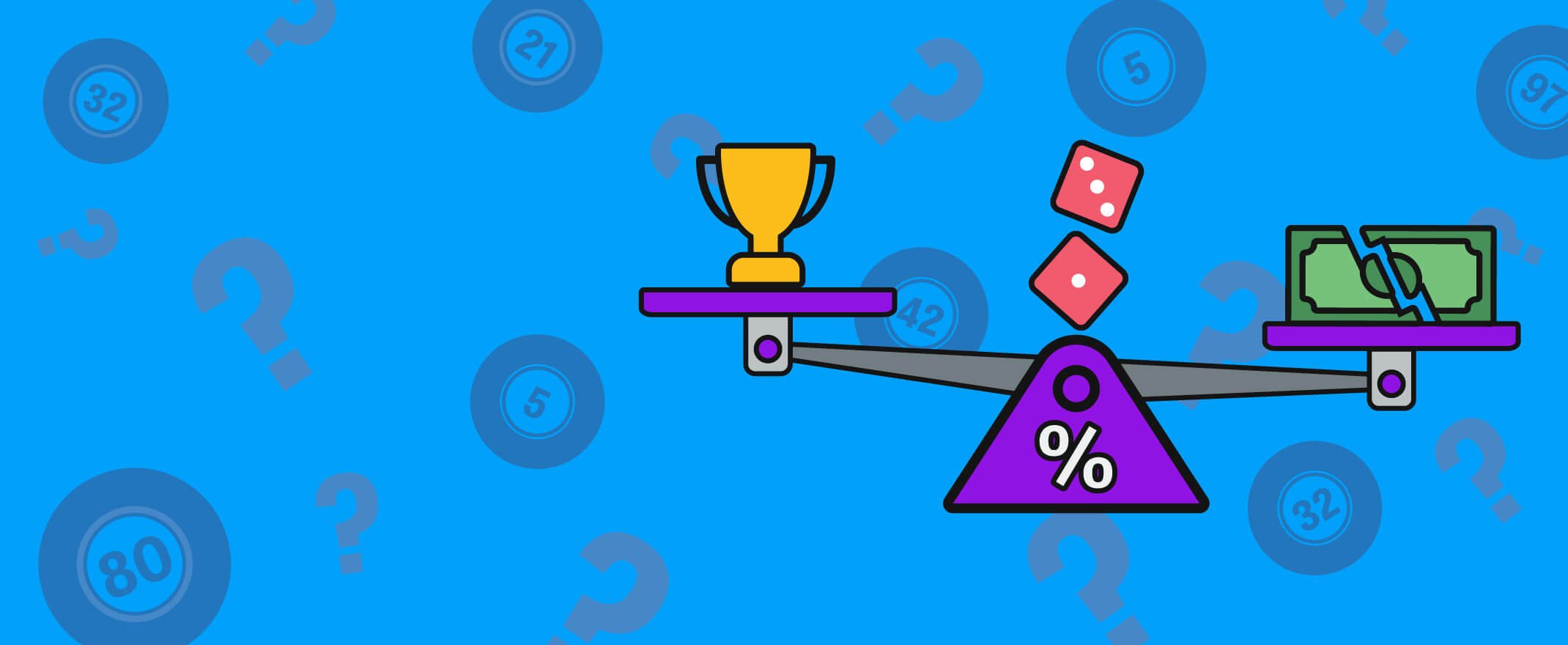In our craps strategy guide, we discuss the merits of making bets with a lower house edge as a way to improve the chances of winning. In this guide, we will be talking you through the practical choices you can make when it comes to betting and how the maths informs those choices.
Dice combinations
In each round of craps, the shooter throws a pair of six-sided dice. The results of each throw range from 2 to 12 and can be formed in different ways.
For instance, a result of 4 can be formed of the following:
- Dice A showing 1 and Dice B showing 3
- Dice A showing 2 and Dice B showing 2
- Dice A showing 3 and Dice B showing 1
The same applies to all the other possible results except the 2 and the 12, which can only be formed in one way (1+1 and 6+6, respectively).
Because each die has six sides it can potentially land on, we are looking at 36 unique potential outcomes every time the dice are rolled. By understanding this aspect, we can work out the percentage probability of a particular result. The formula is as follows:
[target outcomes] ÷ [total outcomes] x 100%
Let’s take a practical example using the outcome of 11. A result of 11 can be formed in two ways: 5+6 and 6+5. Those are our target outcomes. We already know that there are 36 total outcomes, so our formula will look like:
2 ÷ 36 x 100% = 5.55%
The percentage possibility of landing 11 on a roll of craps is 5.55%. We can also visualise the odds in a different way, which we will discuss next.

Odds
When it comes to odds, players can sometimes be confused by which odds are being referred to. There are the odds of a particular result appearing, in the sense of ‘what are the odds of landing a 6?’. There are also payout odds and these are set by the casino, determining what proportion of your bet will be paid out if you win.
We shall be talking about the first type of odds here as those are the ones that can be calculated mathematically. In the section ahead of this one, we introduced a formula to work out the percentage probability of a particular result. With one small tweak, that same formula can be used to generate an odds ratio.
All we need to do is leave off the final bit of the equation i.e. multiplying by 100 to get a percentage result. Using the outcome of 11 as an example again, let’s see that in action:
2 (target outcomes) ÷ 36 (total potential outcomes = 1/18
This result shows us that one in eighteen rolls likely to show an outcome of 11. So if of 18 rolls 1 is the desired result, then the odds of landing 11 are 17:1.
We can perform this calculation for any desired outcome and we have done just that, compiling this information in the handy table below. Understanding how likely (or unlikely) a particular result is can help the player when it comes to making their bets.
| Dice Total | Combinations | Odds |
|---|---|---|
| 2 | 1+1 | 35:1 |
| 3 | 1+2/2+1 | 17:1 |
| 4 | 1+3/3+1/2+2 | 11:1 |
| 5 | 3+2/2+3/1+4/4+1 | 8:1 |
| 6 | 1+5/5+1/3+3/2+4/4+2 | 6.2:1 |
| 7 | 3+4/4+3/2+5/5+2/1+6/6+1 | 5:1 |
| 8 | 4+4/5+3/3+5/2+6/6+2 | 6.2:1 |
| 9 | 4+5/5+4/3+6/6+3 | 8:1 |
| 10 | 4+6/6+4/5+5 | 11:1 |
| 11 | 5+6/6+5 | 17:1 |
| 12 | 6+6 | 35:1 |
House edge
The house edge is what keeps casinos in the business. It is the advantage that the ‘house’ i.e. the casino has over the player in any gambling activity. We can also think of it as the difference between the probability of a particular result and the payout ratio. Generally speaking, results that are more likely to appear pay out less than those that are less likely.
Because craps has many different kinds of bets, including single roll, multi-roll, place and proposition bets, there is no one single house edge value like in a slot game for example. This means that each bet requires its own calculation of the house edge.
Luckily, the JohnSlots team has been playing craps a long while and doesn’t mind knuckling down to do some calculations on our readers’ behalf. The table below outlines the house edge on each bet.
| Bet | House Edge |
|---|---|
| Pass Line/Come | 1.41% |
| Don’t Pass/Don’t Come | 1.40% |
| Pass Line/Come Bet 2x odds | 0.85% |
| Don’t Pass Line/Don’t Come Bet 2x odds | 0.83% |
| Place 6 & 8 | 1.52% |
| Place 5 & 9 | 4% |
| Place 4 & 10 | 6.67% |
| Buy 6 or 8 | 4.76% |
| Buy 5 or 9 | 4.76% |
| Buy 4 or 10 | 4.76% |
| Lay 6 or 8 | 4% |
| Lay 5 or 9 | 3.23% |
| Lay 4 or 10 | 2.44% |
| Field Bet | 5.56% |
| Any Craps | 11.11% |
| Hardway 6 or 8 | 9.09% |
| Hardway 4 or 10 | 11.11% |
| Any 7 | 16.70% |
Dice control – online casinos vs land-based casinos games
Some craps players claim that they have developed a method to influence the outcome of a roll by throwing the dice in a certain way. This ‘precision shooting’ involves reducing the amount of rotational force during the throw so that the dice are less likely to spin on contact with the opposite wall of the craps table and thus remain in the axis the shooter desires.
While not strictly speaking cheating, which is illegal, many casino venues frown upon players using dice control methods at their craps tables and doing so might even get you banned from the premises.
Dice control is, as you might expect, not possible when playing online. The result of the dice roll, like everything else, is randomly generated by the craps software.
The best bets in Craps
The best bets in craps are all determined by the maths. House edge should be the biggest factor when choosing what outcome to bet on. Below we briefly outline the top bets in craps and why they hold that title.

Pass line bet
This is the bet with the lowest house edge of all, at just 1.41%. This means that for every £100 you wager on this bet, you will lose just £1.41 overall. Of course, this is a theoretical long-term calculation but it does make a compelling argument for the Pass line bet.
Come bet
Just like the Pass line bet, the Come bet has an attractively low house edge of 1.41% and that’s a good enough reason to make this bet.
Don’t Pass bet
Considered ‘against the grain’ of the game, few players make this bet but in truth, more of them should. It has an extremely low house edge – experts put it at between 1.36% and 1.4%.
Don’t Come bet
This bet shares the stats of the Don’t Pass bet and it is similarly attractive to astute players, with a low house edge of between 1.36% and 1.4%.
Odds bet
In theory, the odds bet has no house edge at all. Zero. Nada. Of course, there is a caveat – to make this bet, you will have had to make a Pass/Don’t Pass bet already and have been exposed to that house edge. Still, an appealing way to up the ante without having to put up with that pesky house edge!
Place the 6 and/or 8
When making these bets, the player is wagering on the selected number appearing before a 7. The house edge on a place bet on 6 and on a place bet on 8 is 1.52%, which is still on the low end of the scale. Both of these results have a 6.2:1 chance of appearing, making them the second-most likely outcome overall.
Don’t Place 6 and /or 8
This is the opposite of the place bet, often called the ‘No 6’ and ‘No 8’. A house edge of 1.82% makes this bet appealing to players who want a tiny bit more risk than the other bets but not all that much.
Summary
There are heaps of bets you can make when you play craps and while the table layout is helpful in working out what each bet is called and what you’re betting on, it is worth putting in a little extra effort to understand how probability and house edge interact. This knowledge will help you make sound bets every time.

Frequently asked questions about winning at Craps
The rules of craps are simple to understand, especially with a little practice. However, there are other forces at work when the dice are rolled, the house edge prime among them. Below are some of the questions we frequently encounter that have to do with winning at craps.
What is the best bet in Craps?
There are two bets that share that title in a craps game – the Pass line bet and the Come bet. Both have a house edge of 1.41%, the lowest available at the craps table.
What are the best odds in Craps?
The result with the best chance of landing is the 7 because it can be made up with the highest number of combinations. If we are talking about payout odds, the bets with the highest are the Hardway bets, which pay out at 30:1.
What is the house edge in Craps?
The house edge is the advantage that the casino has over the player in any game, including craps. Craps has a large spread of house edge values, from 1.41% at the lowest to 16.7% at the highest.
What are the worst bets to make in Craps?
The Any 7 bet is the worst available, with the high house edge of 16.7%. This single-roll bet is a bet on a 7 appearing on the next roll.
Does dice control actually work?
Dice control is surrounded by controversy. Some question whether it works while others, who believe that it could, make the case that it is close to cheating. Many land-based casinos fall into the latter group and will not hesitate to ban players caught doing it.
That said, there is no data to show that dice control can have a statistically significant impact on dice roll outcomes, only that players doing it might be able to influence the result slightly.
Casino Game Specialist
6+ Years of Experience

Statistics
35 Articles
Harper Gallagher is a respected specialist in online casino games, particularly craps, poker and casino table games. By staying abreast of emerging technologies and trends, she inspires others to pursue their own passions in the exciting world of online casino gaming.
Expert On:




